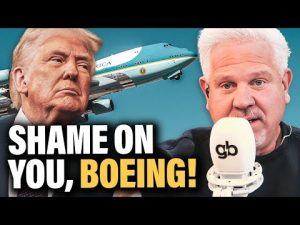**Boeing’s Delay Saga: A Call to Reclaim American Ingenuity**
In 2018, Boeing took a bold step forward in its commitment to innovation by placing an order for two majestic 747 aircraft, a decision that promised to soar into the future. Fast forward to 2028, and the timeline has morphed into a bewildering saga akin to a soap opera—one that might not conclude until 2035 or 2036! How, one might ask, did a well-respected titan of aviation become mired in such an interminable delay? It seems Boeing has momentarily lost sight of its identity as a beacon of American excellence and ingenuity.
In discussing this troubling predicament, one can’t help but feel a sense of nostalgia. With many employees in the family still hard at work for Boeing, it’s clear there’s a deep-rooted love for what the company once represented. Those who remember Boeing’s heyday reflect on the legacy of innovation and excellence that seems to have taken a backseat to something else entirely—“corruption,” “diversity, equity, and inclusion initiatives,” or perhaps just plain bureaucracy. The working men and women of Boeing know what their company is capable of; they remember the pride it once instilled in its workforce.
It is unsettling how accepted delay has become in this modern age, where society is often conditioned to say, “I can’t.” The spirit of “yes, we can” that has shaped this nation’s history seems to have waned, replaced by an attitude that sometimes conveys helplessness. This sentiment contrasts sharply with the resilient American spirit that drove our forebears through trials and tribulations—the very spirit depicted in stories of courage, like those of World War II soldiers who turned watches into tools for escape from oppression. Such tales remind us that when faced with adversity, ingenuity and determination can yield remarkable solutions.
Boeing needs a wake-up call, a reminder of both its rich heritage and potential. The employees should stand united, advocating for the return to the principles that made Boeing a leader in the aviation field. During World War II, American ingenuity was on full display, as individuals banded together to solve impossible challenges without modern conveniences. Comparing their unimaginable escapes to current delays in aircraft production echoes the need for a reclamation of the mindset that once fueled America’s march to greatness.
The result of this spirit—or lack thereof—reveals itself in Boeing’s sluggish production timelines. An impressive feat, like digging a two-foot square hole that stretches for more than 300 feet, is hard to imagine in today’s context. However, those who did it in dire circumstances reflected the possibility of human resilience against all odds. Boeing must not let complacency take root; instead, they should embrace the challenge of returning to their roots—the roots that made “the sky the limit” for American aviation.
The call to action is clear: it’s time for Boeing to either reclaim its position as a leader in innovation or step aside. After all, the American legacy thrives on hard work, dedication, and pushing past boundaries that others deem impossible. Boeing employees need to raise their voices, insisting that the ethos of “yes, we can” is not just a political slogan but a rallying cry for all who believe in American exceptionalism. If Boeing aims to be an American symbol of triumph once more, a shift in perspective is necessary—work with vigor, build those planes, or pass the baton to someone willing to seize the reins of excellence!







